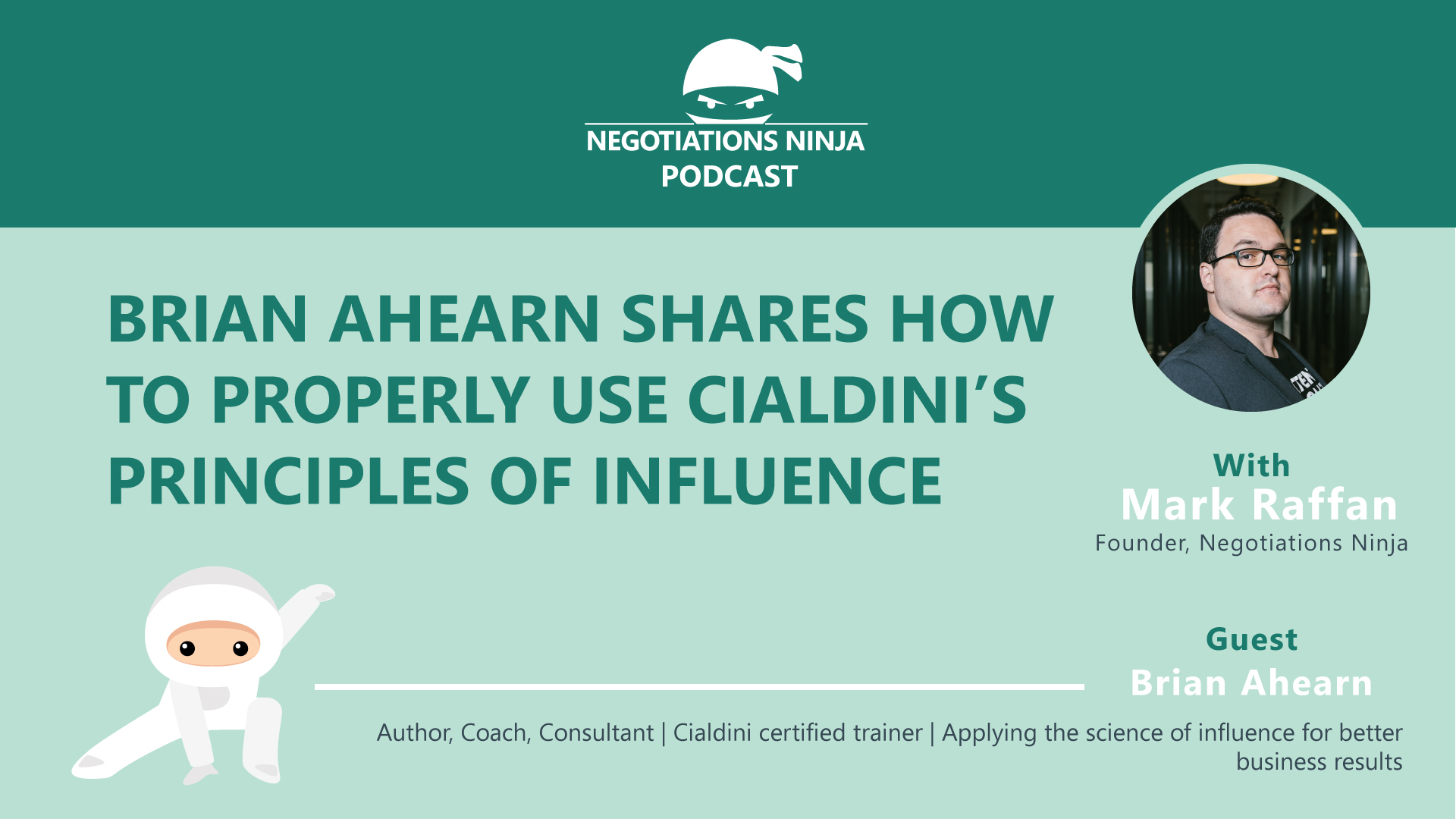Most people in the world of sales and negotiation are aware of Cialdini’s principles of influence outlined in his book, “Influence: The Psychology of Persuasion.” But that doesn’t mean you know how to properly use the principles in your work. In this episode of Negotiations Ninja, Brian Ahearn shares the major challenges salespeople have when influencing others. We talk about how the principle of influence can transform the way you sell. Brian also shares the principles that insurance salespeople excel at that can be leveraged across industries. Don’t miss it!
Outline of This Episode
- [1:59] Learn more about Brian Ahern
- [3:04] The major challenges for salespeople
- [4:40] Cialdini’s Principles of Influence
- [7:00] The principles that people struggle with
- [8:08] What insurance salespeople do well
- [10:01] Employing the right principles at the right time
- [14:20] How to use social media as a tool
- [17:37] How Steve Jobs utilized influence at scale
- [20:23] The concepts of commitment and consistency
- [22:34] Deal-making and rationality
- [25:24] How to learn more about Brian
The major challenges for salespeople
When Brian worked with independent agents and ran workshops, the first question he was often asked was, “What’s the best way to close?” Brian believes that the best way to close begins when you meet someone for the first time and shake their hands. Everything builds on that. There’s no magic wand or one single thing you can do. But a series of yeses throughout the sales cycle will ultimately get you to the point to close the sale. But Brian believes it should be less about closing and more about “informing people to the yes” using psychology. It will just make sense to do business with you.
What does “informing into yes” mean? The principles of influence make it cognitively easier to understand the merits of what you’re offering and ultimately say “yes.” When you begin to tap into those, it becomes more conversational versus a sales process. It will resonate more with them. You can effectively use social proof to show them how other customers are benefiting from your product—and how they can too. The research shows it makes it easier.
Cialdini’s Principles of Influence
Robert Cialdini popularized the principles of influence. He put these age-old principles into a framework that people could understand. His original book consisted of six principles, with a seventh added to the most recent revision. Brian has embraced and used these principles in his training for over 20 years. What are they?
- Liking: It’s easier to say yes to someone they know and like.
- Reciprocity: The natural obligation to give back to someone who’s first given to us.
- Authority: It’s easier to follow the lead of someone we see as extremely wise or an expert.
- Social Proof: This is how we’re influenced by what other people are thinking, doing, and feeling.
- Consistency: we feel an internal psychological and external social pressure to remain consistent between what we say and what we do (when our words and deeds align).
- Scarcity: The feeling that we value things more when they’re rare or going away.
- Unity: It’s not just liking; it’s about shared identity. It’s easier to say yes to people who are family, friends, or our “tribe,” i.e., fellow marines.
Knowing what the principles of influence are is quite different than properly putting them into play.
The principles that salespeople struggle with the most
The principle of being liked is easy to understand. But often, salespeople try so hard to get someone to like them that they come across as desperate. To employ that principle correctly, you have to get to know and like the other person—not the other way around. You’ll genuinely want the best for them. When someone sees that, they become more open to what you’ll share.
Sometimes with the principle of reciprocity, you can give in a way that people know there are strings attached. When they feel like strings are attached, your giving doesn’t feel like it’s genuinely to benefit the other person. It just feels like a sales tactic. People can sense these things and tend to resist.
What insurance salespeople do well
Most of the agents Brian worked with excelled at getting to know the people in their community. They can get and keep customers for a long time because they’re great at building relationships. They understand that protecting the assets of an individual or family requires knowing them on a personal level.
When you get to know someone, you can use social proof because you’ll then recognize other people who are similar to them. It helps inform you of what to give them. Instead of handing over a company pen, you can offer them something that made you think of them. All of these things accumulate and help them feel that you really know and understand them.
How do you employ the right principles at the right time? What did Brian learn from Steve Jobs that transformed his presentations? How can you use Cialdini’s principles? Listen to the whole episode to learn more!
Resources & People Mentioned
- The Presentation Secrets of Steve Jobs by Carmine Gallo
- PresentationZen by Garr Reynolds
Connect with Brian Ahearn
- Brian’s Website
- Connect on LinkedIn
- Influence PEOPLE: Powerful Everyday Opportunities to Persuade that are Lasting and Ethical
- Persuasive Selling for Relationship Driven Insurance Agents
Connect With Mark
- Follow Negotiations Ninja on Twitter: @NegotiationPod
- Connect with Mark on LinkedIn
- Follow Negotiations Ninja on LinkedIn
- Connect on Instagram: @NegotiationPod




